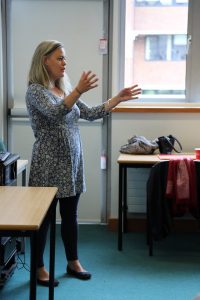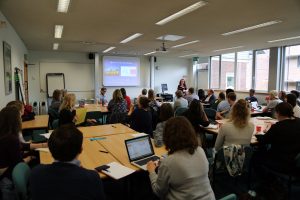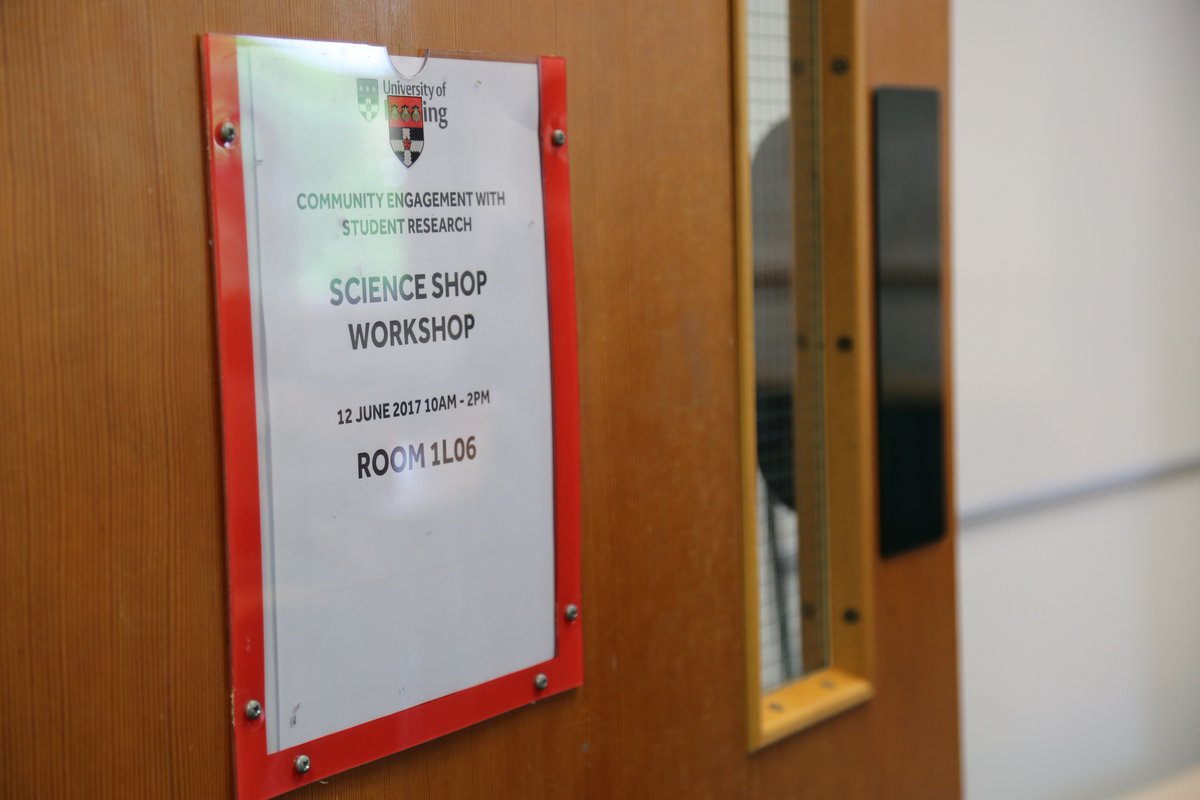
Members of the ‘Participation Lab’ have been investigating the possibility of developing a Science Shop at the University of Reading (UoR). Research collaborations between universities and communities have the potential for significant, mutual benefits for all involved. One way in which these benefits may be achieved is through the use of intermediary organisations, known as ‘Science Shops,’ that link communities’ needs for knowledge and research with the skills and expertise of university students. In June 2017, we invited community organisations, academic researchers, students, and teaching staff to a workshop exploring what opportunities and challenges might exist if a Science Shop was established at UoR. In this post I provide an account of that meeting, including an explanation of the science shop idea, the benefits and challenges that were identified, and the potential solutions and next steps for how this could be taken forward. Read on to find out more!
What is a ‘Science Shop’?
Known variously as ‘science shops,’ ‘knowledge co-operatives,’ and ‘front doors’; science shops have existed at universities around the world since the concept was introduced in The Netherlands in the 1970s. The rationale behind the science shop idea is to provide independent, participatory support for research that responds to the concerns experienced by society. A science shop effectively acts as an interface between academic researchers and society, thus responding to communities’ needs for knowledge and expertise.
As illustrated in the diagram below, in practice, a science shop at UoR would involve a central person to be based at the university to act as an intermediary between communities and researchers. Community groups (including not-for-profit organisations, social groups, environmentalists, consumers, resident’s associations etc) would approach the science shop with an idea or a request for new research. The science shop would subsequently connect them with academics who had expertise in the proposed research topic. The academics would, in turn, arrange for university students to conduct research in collaboration with or on behalf of the community groups.
At the June workshop, Alice Mauchline from the Participation Lab pitched the idea of a science shop at UoR to members of academic staff, students, community groups, and teaching staff. We then encouraged the group to explore the potential benefits and challenges for both the university and the community. We were supported in our discussions by our mentor, Emma McKenna, from the Science Shop at Queen’s University Belfast. I describe the findings below.

What are the potential benefits for the community?
Before engaging in discussions about the benefits a science shop could have for the community, it was important to define ‘the community’. The researchers in attendance conducted research at a range of geographical levels, from the local to the global. However, it was decided that, as a starting point, the proposed science shop should concentrate on the local-level community.
The potential benefits of a science shop for the local community were aptly demonstrated by an account, provided by representatives from the ‘Whitley Researchers,’ of how linking up with University research had directly benefited their community. Through research in collaboration with UoR, they had successfully lobbied Reading Borough Council to change a bus route, making it easier for people in their community to access Reading town centre.
The case of the Whitley Researchers showed that being able to access and be supported by a researcher committed to participatory research was invaluable to their development and training, and to their success in using research to effect change locally. Several representatives of other community groups also indicated they would benefit from research supported by UoR. For example, a representative from an organisation that helped support refugees in Reading stated they would benefit from research into the experiences of refugees in Reading. Similarly, a women’s support charity indicated that university-supported research could help strengthen their influence on policy.
It is evident then, that local community groups would benefit from collaborative research. The workshop attendees largely agreed that the existence of an intermediary organisation or individual to coordinate such research would thus be beneficial. Indeed, the Whitley Researchers emphasised it would be useful to have a point of contact at UoR, who would ‘reach out,’ to community groups to help with their research needs. Similarly, representatives of community relations staff and the Student’s Union described how they regularly receive emails from community groups asking for help with research. They emphasised that community groups would find it useful to have a central point of contact who could deal with such enquiries.
What could the benefits be for the University?
In the workshop, we also identified the benefits a science shop could have for the university. We found that the idea would fit well with the UoR’s ‘Vision and Ambition Strategy’ to 2026. As part of this, the university states that it aims to maintain and enhance its role as a ‘leader in research,’ by being: ‘responsive to, stimulated by and informing changes in the world around us.’ The creation of a science shop would help to realise this aim by identifying and acting upon opportunities to respond to and inform the needs of community groups.
We also recognised that a science shop would enhance the role of UoR as a leading Higher Education institution by providing opportunities for students to develop new skills. In the proposed science shop model, research projects would be carried out by UoR students in collaboration with community groups, and supervised by academic staff. The workshop attendees agreed this would create opportunities for academic staff to provide research-based teaching, based on real-world problems; UoR students would therefore benefit from engaging as active participants in the co-production of knowledge with communities. Additionally, they would benefit from the development of important social skills, including communication and social responsibility that would improve their employability. Indeed, one of the students who attended, and had conducted research with a community organisation for her undergraduate dissertation, attested that her experience had helped her develop new social skills. She indicated the research had helped her develop new connections with the community, to become less judgemental of others, and to enhance her ability to build rapport with community members.
The workshop therefore indicated that a science shop would be highly beneficial for UoR. Increased collaborative research with community groups would help the university achieve its goals, and enhance the learning and employability of its students. It was evident, therefore that the development of a science shop would be desirable for both community groups and UoR. However, both sides had concerns regarding how a science shop would be implemented and how it would operate. These are outlined below.
What potential challenges exist?
The workshop participants evidently thought that the development of a science shop at UoR was a potentially beneficial idea. However, the purpose of the workshop was also to identify and consider solutions to the challenges that might arise. The workshop attendees identified two main challenges that would need to be overcome to enable the successful development of a science shop: balancing the interests of community groups and the university, and avoiding replication of existing collaborative research at the university. I have structured these, and the potential solutions that were proposed into the table below.
| Challenges | Description | Solutions |
|
|
|
|
|
|
Learning and next steps
In this post, I have described the findings of a workshop held by the Participation Lab to explore the possibility of developing a science shop at UoR. The workshop enabled representatives of academic staff, university students, teaching and learning staff, and community groups to learn about what a science shop would involve. It would most likely take the form of an individual or organisation, based at UoR, who would be responsible for working with the local community to identify their research needs. They would subsequently respond to these needs by connecting community groups with academic staff and students in relevant fields of expertise, to facilitating collaborative research benefiting both the university and the community.
The workshop also enabled the Participation Lab to learn about what these mutual benefits would be. Specifically, a science shop would benefit the community by providing a centralised point of contact to which they could bring their research needs. Community groups indicated they could benefit from collaborative research that would inform their practice and strengthen their influence on policy. A science shop would also benefit UoR by helping it meet its aim of conducting cutting-edge research that is informed by and responsive to the needs of society. Equally, it would enhance teaching and learning through engaging students in community-based research, and enabling them to develop new research and social skills.
However, the workshop also raised some potential challenges in the creation of a science shop. In particular, these involved balancing the interests of the university and the community, and avoiding duplication of effort within UoR. The proposed solutions to these challenges included scoping the nature and extent of community groups’ research needs, mapping existing collaborative research at UoR, providing rigorous recruitment and training of students and academic staff, and managing expectations about what is possible.
Following the workshop, representatives from the Participation Lab developed a set of next-steps to be taken. These are:
- Map existing collaborative research with communities at UoR and write up case studies and examples of good practice. Define the opportunities for student engagement in this research.
- Meet in September with a core group of interested actors who can help take this forward.
- To hold a training session for academic staff on best practice in participatory, collaborative research.
- Conduct a scoping exercise to establish the nature and extent of community groups’ research needs. Identify small pots of funding that could be used to support this.
- Aim to submit a funding bid in 2018 for a member of staff to act as a ‘science shop coordinator.’
Follow the Participation Lab blog and Twitter (@participlab) for further updates! Please get in touch if you are interested in being involved with this exciting initiative.

